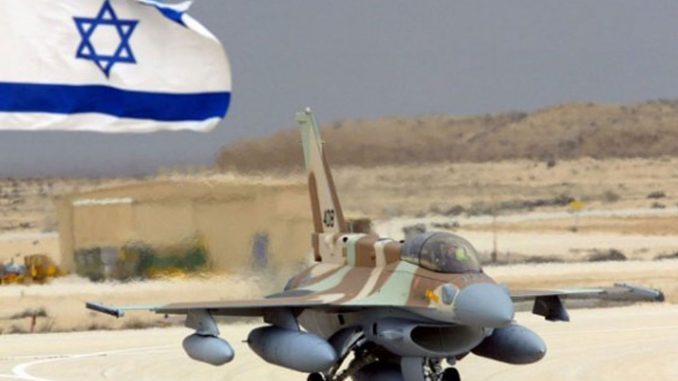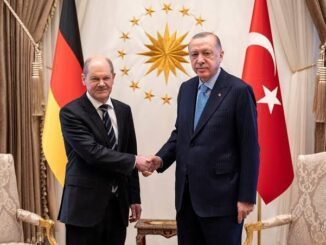
Reports said that Israeli jets carried out airstrikes near the Syria’s capital early Wednesday, a few days after Israeli jets were targeted in Syria for similar attacks.
Syrian opposition news outlets reported that the airstrikes took place in the Mount Qasioun region near Damascus overnight.
The Israeli raids targeted Syrian army posts in the area, the reports said, in the fourth round of airstrikes attributed to Israel in Syria in less than a week.
Civilians in Damascus reported hearing loud voices in the middle of the night similar to the ones heard after previous Israeli attacks.
There was no immediate confirmation from Jerusalem, nor any information on casualties or damage.
This report came a few hours after Israeli Prime Minister Benjamin Netanyahu vowed to continue hitting weapons convoys and rebuffed claims Russia had ordered the strikes halted.
“It’s simply incorrect to say the Russians are changing their policy toward us,” Netanyahu said.
The report on Russia changing its stance came after an Israeli airstrike on Friday to which Syria responded by firing anti-aircraft missiles at the departing Israeli warplanes. The Israeli strike reportedly nearly missed a Russian asset and Moscow summoned the Israeli envoy following the exchange.
“My policy is consistent, and this is also what I told Putin,” the prime minister said during a visit to China. “We will not allow Israel to be attacked from Syrian territory and we will not tolerate the transfer of advanced weaponry of those entering Syria — Hezbollah — to the extent that we detect it.”
Was an Israeli jet shot?
Assad regime’s army high command confirmed in a statement on Friday that Israeli jets breached Syrian airspace early in the morning and attacked a military target near Palmyra.
The high command described the attack as an act of aggression that aided the Islamic State (ISIS) group, which is fighting against the Syrian government.
It said its air defenses shot down one of four Israeli jets over what it called “occupied ground” and damaged another.
Syrian media reported that four IAF jets took part in the raid, which occurred in the early hours of Friday morning, and claimed to have succeeded in shooting down an Israeli plane and hitting a second one as they were carrying out strikes near the city of Palmyra.
However, the Israeli army denied that any jets had been downed, stating that “at no point was the safety of civilians or IAF aircraft compromised.”
There were no reports by the Israeli army of any aircraft lost in the operation.
Jordanian news reports said an “unidentified object” fell from the skies on Thursday night in the northern area of Irbid, after which security forces surrounded the area of impact.
Pictures shared on social media showed what appeared to be part of a missile that had landed in a yard.
It was not clear whether the object was part of missile intercepted by Israel, part of an Israeli missile, or another object.
Hard time for Putin
After this incident, Russia has summoned the Israeli ambassador to Moscow for clarification.
Israeli media said Gary Koren was summoned by the Russian Foreign Ministry on Friday, a day after the Israeli envoy presented his credentials to Russian President Vladimir Putin.
It seems a hard time of Putin as the interests of his allies, Assad regime, Iran, and Israel, became more contradicting than ever.
Prime Minster Benjamin Netanyahu’s one day visit to Moscow on March 9 was the latest round in the ongoing coordination established in September 2015.
The summit was conducted in a very positive atmosphere. Russia’s official news agency Tass gushed: “Israeli prime minister hails Russia’s role in fight against Islamic terrorism.”
Netanyahu attaches great importance to reaffirming the basis for “synchronization” with Vladimir Putin, both operationally and diplomatically.
After days of the Russian September 2015 announcement in entering the Syrian war, Netanyahu was in Moscow. He was eager to coordinate, both operationally in the skies above Syria where the Israeli air force has enjoyed all but absolute freedom of action, and diplomatically to maintain Russian support for explicit “rules of the game” that serve to accommodate Israeli interests and deter efforts by any party – notably Hezbollah, Iran or the enfeebled regime itself – to successfully challenge them.
In addition, Netanyahu sought to intensify Putin’s understanding of Israel’s interests in Syria as well as its red lines. Netanyahu stressed that Israel will not allow any attempts by Iran or Hezbollah to send their forces to Israel’s border with Syria in the Golan Heights.
“With or without Syria’s agreement, Iran will attempt to establish a permanent military presence in Syria, both on land and at sea,” Netanyahu said.
Iran-Israeli confrontation
In addition, Israel has effectively pre-empted a number of attempts in recent years to create a military infrastructure in the region.
Hezbollah considers all of Israel to be within its range, with or without a Golan front in Syria.
Iran, too, has a demonstrated interest in, at the very least, testing Israel’s opposition to the deployment of hostile forces allied to Teheran along the border.
In addition, Israel has conducted airstrikes repetedely against Hezbollah weaponry in Syria, destroying military sites belonging to Assad regime during these operations and enraging Iran as a great part of its influence in the country relies on Hezbollah terrorist militia.
Russia has forged strong operational ties with Hezbollah and Iran but this does not extend to its endorsement of a militant regional strategy against Israel, in the Golan or elsewhere.
Neither Moscow, nor Damascus for that matter, is interested in empowering its wartime allies to create a military infrastructure on the Golan with the capacity to independently engage Syria, or Russia, in a war against Israel.
Nevertheless, Netanyahu’s efforts to win unambiguous Russian guarantees to limit Iran and its proxies are bound to be disappointed.
As the Syrian war winds down, Russia is increasingly expanding its role as an arbiter among and between enemies and erstwhile allies, a role that offers a compelling rationale for its continuing influence in Syria.
Playing this role will exact a price, however. If until now Putin has been able to contain the contradictions of a policy that accommodates Israel as well as its enemies, in the next phase of the battle this balancing act may not be so easy, and summoning the Israeli convoy may be just the first incident in many to follow.



